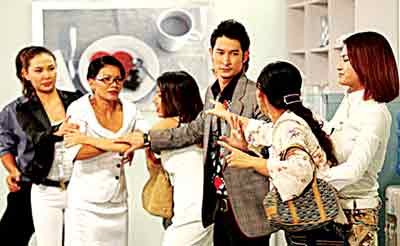With the exception of a few standouts, Vietnamese versions of world-famous TV series have struggled with success.
One of the most recently anticipated series, “Ngoi nha hanh phuc” (Full House), a Vietnamese version of the Korean TV series “Full House,” ultimately failed to win over domestic viewers, and it was not an isolated case.

An experienced local scriptwriter says one problem is that Vietnamese producers lack expertise and purchase foreign scripts that are simply not adaptable for domestic audiences.
Vast differences in foreign culture and lifestyle pose a headache for producers trying to rewrite scripts for Vietnamese viewers, often with poor results.
Another reason that foreign-inspired series have failed to take off here, according to the screenwriter, is that local script-editors are often inexperienced and have little time to do a good job of translating and adapting the program.
Others have suggested that the core ability of some Vietnamese directors may be lacking. The skill of the director, especially when it comes to adapted series, can make or break a program.
Most foreign-adapted series that have failed to find success in Vietnam, have been directed by those who are young and inexperienced.
Local actors and actresses also play a pivotal role in how successful an adapted series is. Most of them fail to truly understand the characters and their situations due to the stark difference in culture and lifestyle. This comes across onscreen in many ways, including overdramatizing by actors.
The longer running time of most foreign series is also an obstacle to both Vietnamese directors and actors.
Most local directors are only familiar with short-running series, and find it difficult to adjust their approach. Many actors are former models and singers, and have only a little acting experience. This is not lost on frustrated viewers who complain that adapted versions are of poor quality and nothing like the originals.
However, a few foreign-adapted series, including “Co gai xau xi” (Ugly Betty), “Nguoi me nhi” (A Mother’s Soul in a Child’s Body), and “Gia dinh phep thuat” (A Family With Charm) have proved successful in Vietnam.
“Co gai xau xi” was based on the Colombian series “Yo soy Betty, la fea” (I am Betty, the Ugly). The popular show was also adapted by several other countries around the world and enjoyed huge success.
Despite stark differences between the original script and the Vietnamese version, the sitcom was well-adapted and attracted a large local audience. The script-editors were credited with successfully maintaining the original characteristics of the show that made it so popular while adding a distinctly Vietnamese flavor.
The triumph of “Co gai xau xi” where others have failed, thus appears to lie in the expertise of the translators, editors and those who re-scripted the original. Doing a good job also requires a considerable amount of time.
Reworking a foreign script can take even longer than writing a new one.
Scriptwriter Thuy Linh, who worked on the translation of “Yo soy Betty, la fea” into Vietnamese, said: “We need almost a year to read and translate the original scripts into Vietnamese.
The work is as difficult as writing a new script. Vietnamese society has several unique characteristics, so we need to change the profiles and lifestyles of some of the characters in accordance with the Vietnamese style.”
As evidenced by the failure of many hastily purchased TV series, Vietnamese producers need to carefully consider which foreign programs will work in Vietnam and which will not. Just because a show is successful in other countries, it is not necessarily a recipe for success locally unless it is compatible with Vietnamese taste.
What the country needs most is more local scriptwriters producing creative, interesting shows designed specifically for domestic audiences. But even though many adapted shows have failed, local script-editors say they have gained valuable experience working with foreign scripts.
Thus, adapting foreign programming should not be abandoned entirely at the moment, but should be carried out in moderation until Vietnamese producers begin turning out more quality shows.
























